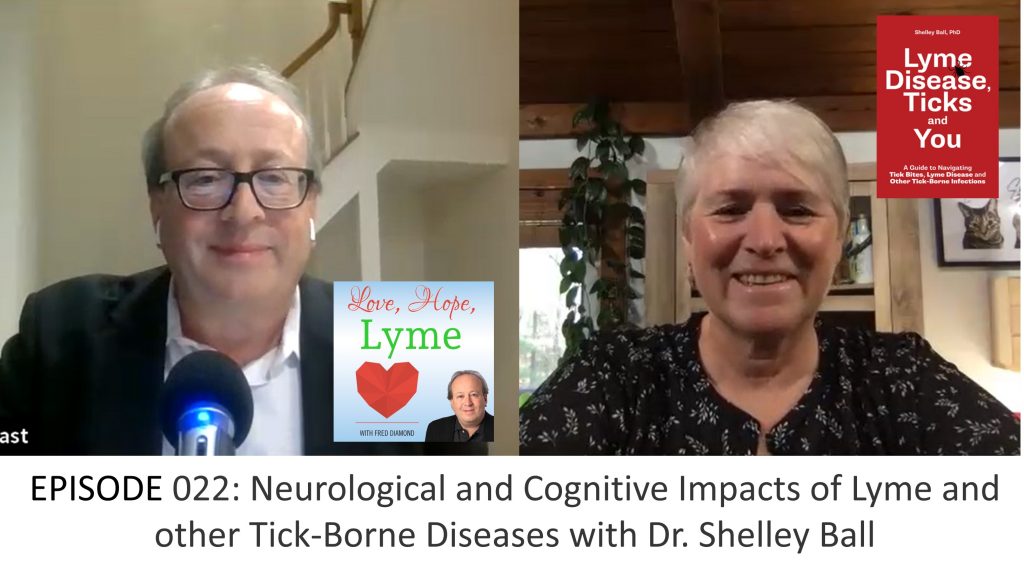PODCAST: Neurological and cognitive issues from Lyme

By Fred Diamond
On this week’s Love, Hope, Lyme podcast, biologist and Lyme survivor Dr. Shelley Ball and I discussed neurological and cognitive issues that are common with persistent Lyme disease.
There’s a chapter on neurological issues in my book Love, Hope, Lyme: What Family Members, Partners, and Friends Who Love a Chronic Lyme Survivor Need to Know. I wrote the book to understand what someone in my life with persistent Lyme was going through. Since the neurological issues concerning Lyme are so personal and potentially extreme, the chapter is intentionally light.
Shelley lives in Westport, Ontario, Canada, an area endemic for Lyme, Anaplasma and Babesia. A biologist by trade, she spent a lot of time outdoors doing field work around the world. In addition to Lyme and Bartonella, she also has Babesia odocoilei, which has been shown to be treatment resistant and contributes to “brain on fire” symptoms as well.
After she was diagnosed with Lyme, she dove into researching the disease to understand what was happening to her. She wrote her book Lyme Disease, Ticks and You: A Guide to Navigating Tick Bites, Lyme Disease and Other Tick-Borne Infections to make what she learned more accessible and less complex to the typical Lyme survivor.
Neurological and Cognitive Symptoms
“Neurological symptoms are very challenging,” she said. “I went for several months where I could barely read, which is hard when you must keep working. The brain issues were the biggest for me such as short-term memory loss. When I was in the thick of treatment, I’d be standing in front of somebody I’d known for years, and I couldn’t remember their name.”
She continued, “Executive functions such as just being able to pay your bills, plan your work, stay on schedule, is challenging. It forces you to try to find aids and little tricks and things that you can do to support yourself. They’re essentially like pre-dementia symptoms. Psychiatric issues, which are a huge part of this, can often lead to personality changes.”
She explained that these infections can cross the blood-brain barrier and cause massive inflammation, so you can end up with a permanently inflamed brain.
“We’re essentially suffering from a brain autoimmune issue where your own immune system essentially is attacking your own brain. It’s especially challenging because there are few good treatments for autoimmune conditions. Usually, it’s steroids and similar things. Those are some of the worst things that you can take if you’ve got chronic tick-borne infections.
“You feel this rage rise in you, and you have no control over it. Your brain is inflamed. This is not something that you’re doing. It is happening to you. You literally must find a way to almost step away and manage it when these things flare out.
“Your personality changes,” she continued, “Not only do the people around you see it, but you see it in yourself. You go through a grief period where you grieve for the person that you were, both mentally and in your personality, but also physically, because you’re just not capable of doing the activities that you used to do. These are very tough issues to deal with and sometimes it drives people away.”
Challenges to Treating Neurological Symptoms
Most chronic Lyme survivors struggle with pain, but the neurological issues can be the most challenging.
Shelley said, “There are so many aspects to it. There’s the direct impact on brain tissue, there’s the inflammation, there’s the autoimmunity and the immune component of it. You’re trying to deal with all these things. One of the keys is to try to get that inflammation down.”
“I’ve had some fascinating conversations with other Lyme patients about treatment, because we’ll often have flare-ups, and a lot of people will turn back to antibiotics to manage those flare-ups. They think that maybe those insistent Lyme bacteria have flared up and turned back into spirochetes and we’re back into an active infection.”
Shelley said, “There are other challenges to treatment. One is the isolation of the disease. Lyme patients especially experience this because we are gaslighted by the medical system that we reach out to, to try to regain our health. There is some initial empathy, compassion, and support, but that dwindles. Then you realize that you are very much on your own suffering in silence.”
She said that if you read the science, when the body becomes inflamed, that inflammation overstimulates your brain and puts you into permanent fight or flight mode. This is known as sympathetic dominance or sympathetic overdrive. Interestingly, it stimulates more inflammation. Then you get stuck in this positive feedback loop of inflammation. What it comes down to is trying to break that cycle of inflammation.
On the podcast, she discusses botanicals and neuro-retraining techniques that might be helpful.
Final Thoughts
I asked for her recommendations for how to live a higher quality life while still dealing with Lyme.
“Try to find ways to find joy. Lyme patients do a lot of grieving. We’ve lost our physical capabilities; we’ve lost our cognitive abilities. We’ve lost our old personality. Sometimes we lose people in our life who just can’t stay there to support us. I don’t believe in toxic positivity, but gratitude is important to focus on what we do have.”
She offered, “I empathize because this really is a shared disease in the sense that even if our loved ones don’t understand what we’re going through, it impacts them. Stay the course. It’s hellish, to be honest. It’s also an iceberg effect where you will probably only see the tip of the suffering that people are going through with these diseases.”
Click here to listen to all episodes of the Love, Hope, Lyme Podcast or on YouTube.
Fred Diamond is based in Fairfax, Virginia and can be contacted via Facebook. His book Love, Hope, Lyme: What Family Members, Partners, and Friends Who Love a Chronic Lyme Survivor Need to Know is available on Amazon. The e-version of the book is always free to Lyme survivors. Send Fred a private message on Facebook for your copy.





















We invite you to comment on our Facebook page.
Visit LymeDisease.org Facebook Page